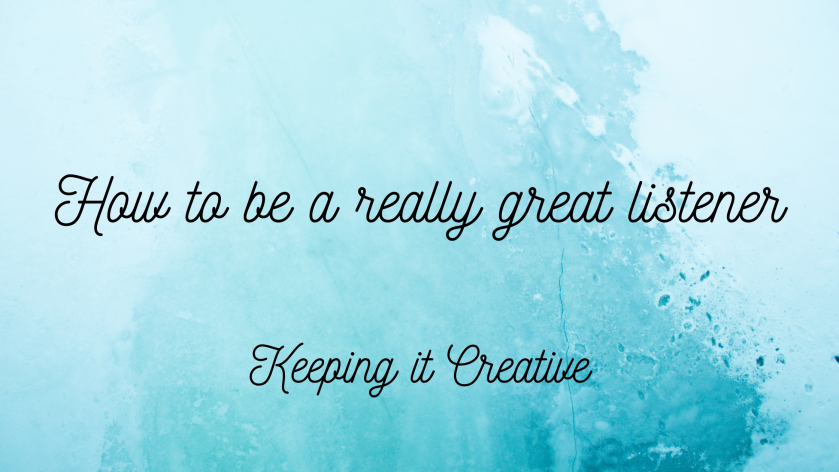
A few weeks ago, I met one of my friends for coffee and cake and then we had a stroll along the beach. It was a really windy day and I found it difficult to hear my friend talking because the huge gusts were blowing her voice away. We were also pretty distracted by plumes of sand which were in danger of going in our eyes. I had to make sure I was listening super carefully and paying close attention as she was talking about a rather delicate family situation that she had been dealing with and wanted to offload. It got me thinking about listening skills and how we teach children to be good listeners by facing the speaker, sitting still, not interrupting and being attentive. But it’s not just kids who need to work on their listening skills, some adults would benefit from a few pointers too. Today’s Monday Matters post is all about being a really effective listener something that I hope most, if not all of us, aspire to be, especially as it is often named as one of the most important qualities we look for in a friend or partner.
If you’ve ever sat in a café talking to a friend and have watched them check their phone repeatedly, start to gaze out of the window or pay more attention to the seemingly far more interesting conversation going on at the table to the left, you will know how frustrating or upsetting it is when you feel like you are not being listened to. Especially if you’ve sat nodding along and offering emotional support for the last ten minutes and now it’s your turn to share. Maybe you’ve read the above and are now thinking about a time when you’ve been the poor listener and have done some or all of the things listed above. Or, perhaps you can recall a time when you offered advice or an alternative point of view when, thinking back, really the speaker was simply needed to vent. Developing good listening skills isn’t easy and requires lots of practise but here are some ideas to help you:
Limit distractions
If you are face-to-face with the person, try to find a quiet space away from visual distractions. Put your phone away, or turn it on to silent so that you’re not tempted to look at it or respond to messages. Maintain eye contact for the majority of the time so that you’re not seeing the myriad of other things going on in the immediate environment which might otherwise attract your attention.
If you’re at home and on the phone, turn music or the TV off and make others aware that you are busy and not to be disturbed. If you have children, try to make sure they’re fully occupied with something and teach them about when it is vital that they do interrupt you (if they’ve had an accident and need your urgent assistance or the house is on fire) and when they should wait patiently until you’ve finished your call. A gentle reminder prior to picking up the phone is a good idea and be sure to praise your child for managing to entertain themselves or resist temptation to interrupt and explain why it was so helpful.
If you are at work and are in the middle of something, politely ask the person to wait until you are done or stop what you are doing and give them your full attention. This lets them know that you are interested in and value what they say.
Figure out their why and their what
Whilst you are listening, think about why they are talking to you and what the message is. Are they looking for a solution or some advice? Might they just be wanting to air their thoughts and feelings? Is the purpose just to let off steam or vent? Don’t offer a solution or your opinion unless you are asked.
If you are unsure what the person is getting at, then be sure to ask for clarification or pose questions which help you develop your understanding. For example, you might start with ‘So, what you’re saying is…’, ‘Can I just check…’ ‘Did you mean…’ etc.
Use non-verbal cues to help you
Look out for non-verbal cues which give you ideas about how the person is feeling and what they might be thinking. Check out their body language, facial expression and gestures. Are they smiling and relaxed or do they look tense and uptight? Think about how you can non-verbally show how attentive you are too. A smile, a nod, a look of concern – whatever feels appropriate based on what is being said (a good reason why it’s important to figure out the person’s why and what).
Reflect back on what you hear
Part of your job as an active listener is to make sure you fully grasp what the speaker is saying. A good way to do this is by paraphrasing what has been said. This is where you restate the information that has been presented to you but in different words, basically reflecting back a summary of the same content e.g. “In other words…”, “I gather that…” etc. In combination with this, you can also check that you understand the feelings and emotions involved, for example, “It sounds like you’re feeling pretty angry about…” or ‘”So, you were frustrated when…” This lets the speaker know that you understand the main messages in what they are saying and also shows that you are empathetic towards them.
Allow for silences
Silence can feel unnerving and the temptation is to quickly fill any gaps between talking. But the person may just be pausing to reflect on what they’ve said or thinking about how they can add to what they are saying so try not to interrupt. If they have finished, a moment’s silence allows you to consider what has been said and compose any questions you may have in a way that indicates how closely you were paying attention and that you are interested in what they are sharing with you.
Follow up on the conversation afterwards
There’s no better way to show how well you were listening and how much you care than bringing up the topic of conversation again at a later date. How you initiate thinks obviously depends on what was said but you might enquire if there are any updates, if they are feeling any better, how an event went or how a situation ended up resolving itself. The person will generally be touched that you remembered and made the effort to follow up on things.
Final thoughts
I hope my ideas have given you food for thought and that you might use one or two of my suggestions to help you become a better listener. We all have room for improvement and I include myself in this. No one can claim to be the perfect listener but we all have a desire to be heard so I think it’s really important to take the time to evaluate our skills and try to make some small changes. Let me know what you consider to be your strengths and weaknesses in terms of listening or, if you would prefer, use the comments space as your chance to air what you find particularly annoying when you’re the one doing the talking. Maybe your little rant will strike a cord with another reader and give them something to think about!


